Posts Tagged ‘Union Solidarity and Development Party’ (83 found)
Burma’s 2015 Elections and the 2008 Constitution
With elections scheduled in Burma on 8 November, this briefing contains detailed analysis of what is likely to happen after election day, the process of the elections, and key election statistics […]
• • •New Election Briefing Paper – Constitution Ensures Continued Military Control
Burma Campaign UK today publishes a new briefing paper – Burma’s 2015 Elections and the 2008 Constitution, containing detailed analysis of what is likely to happen after election day, the process of the elections, and key election statistics […]
• • •Joint Statement on Disenfranchisement and ‘Policy of Exclusion’ of the Rohingya
The undersigned Rohingya Organizations in Europe have strongly denounced the undemocratic actions of the Election Commission against Rohingya parliamentary candidates under the government’s ‘policy of exclusion’ of the Rohingya, debarring them from contesting in the upcoming crucial election scheduled on November 8, 2015, on a false and fabricated charge that their parents were not citizens […]
• • •Burma Army Flexes its Muscles in Political Purge
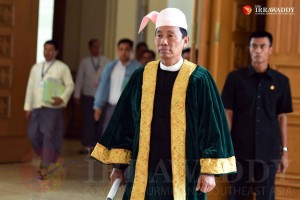 In a dramatic development on the August 12, Parliamentary Speaker, Shwe Mann was ousted from his position as Chair of the ruling party, the Union Solidarity and Development Party (USDP). Security forces surrounded USDP headquarters in Naypyidaw and purged the influential political figure from his position within the party. Information Minister, Ye Htut, stated that his close relationship with National League for Democracy (NLD) leader, Daw Aung San Suu Kyi, as well as support for constitutional change that would reduce the power of the Burma Army was behind his ouster […]
In a dramatic development on the August 12, Parliamentary Speaker, Shwe Mann was ousted from his position as Chair of the ruling party, the Union Solidarity and Development Party (USDP). Security forces surrounded USDP headquarters in Naypyidaw and purged the influential political figure from his position within the party. Information Minister, Ye Htut, stated that his close relationship with National League for Democracy (NLD) leader, Daw Aung San Suu Kyi, as well as support for constitutional change that would reduce the power of the Burma Army was behind his ouster […]
As 2014 Comes to an End, Students Hold Key to New Chapter in Burma Politics
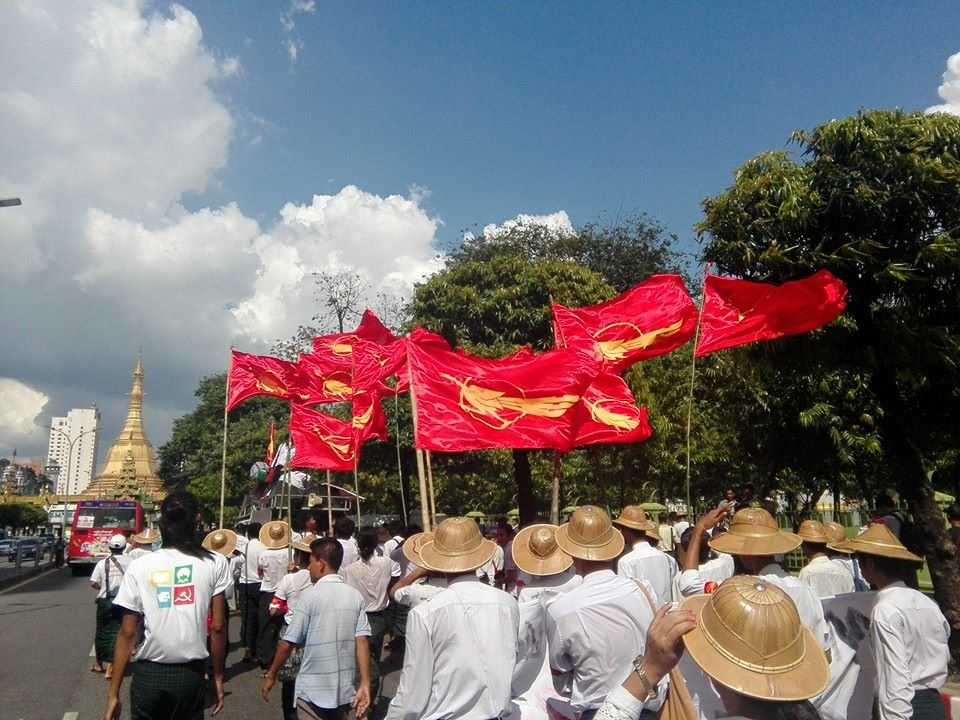 As we count down the remaining days of 2014, Burma Partnership takes a look back at what 2014 has offered. It has been nearly four years since President Thein Sein’s administration took office, and now is the time to digest all the developments during his presidency, to assess what the so-called reform process has really meant for the people of Burma thus far. And now is the time to properly examine this new political landscape and to determine who is who.
As we count down the remaining days of 2014, Burma Partnership takes a look back at what 2014 has offered. It has been nearly four years since President Thein Sein’s administration took office, and now is the time to digest all the developments during his presidency, to assess what the so-called reform process has really meant for the people of Burma thus far. And now is the time to properly examine this new political landscape and to determine who is who.
By the time the reforms were announced, everything was already set in motion to ensure that the reform process was controlled and manipulated by members of the old military regime. Looking at the notorious 2008 Constitution, the institutionalized prescription of 25 per cent of the seats in Parliament for military representatives, the dominance of the Union Solidarity and Development Party, the excessive power of the Burma Army and the National Defense and Security Council, and the growing investment of the State and affiliated business cronies in the media sector, it is not hard to conclude that a new system of repressive governance has been installed – by the same people who were once considered one of the most brutal and authoritarian regimes in the world.
However, it is important to remain hopeful. Although the new political landscape has contributed to the sophistication of old problems and the development of new problems, it has also offered Burma people new opportunities. One of the most inspiring aspects of the political developments in 2014 has been the reinstatement of the role of student unions in the country’s political affairs. Burma’s students were always at the center of major democracy movements throughout history – most notably in 1988 – and have now made a comeback. […]
• • •Obama’s Chance to Make Burma a Genuine Foreign Policy Success
As President Obama prepares to make his second visit to Burma, it is worth looking back at the promises made to him by Burma’s President Thein Sein on his last visit in November 2012 and to assess the worth of these promises. Burma, after all, is largely seen as a foreign policy success by the current administration amid the mess of Ukraine, Libya and the threat of ISIS […]
• •Burma Army Continues to Use the Drugs Trade as a Weapon of War
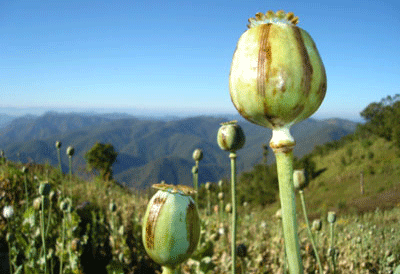 A new report by Kachin Women’s Association – Thailand (KWAT), “Silent Offensive: How Burma Army Strategies are Fuelling the Kachin Drug Crisis” outlines the severity of the drug problem in northern Burma as well as the complicity of the government in the trade. The report shows how the government is using opium-growing militia forces in its operations against the Kachin Independence Army (KIA) as part of a deal in which these militias are given free rein to produce and sell heroin and other narcotics.
A new report by Kachin Women’s Association – Thailand (KWAT), “Silent Offensive: How Burma Army Strategies are Fuelling the Kachin Drug Crisis” outlines the severity of the drug problem in northern Burma as well as the complicity of the government in the trade. The report shows how the government is using opium-growing militia forces in its operations against the Kachin Independence Army (KIA) as part of a deal in which these militias are given free rein to produce and sell heroin and other narcotics.
Thus, as the report points out, it is members of either Burma Army controlled Border Guard Forces (BGF) such as the New Democratic Army – Kachin (NDAK), a splinter group of the Kachin Independence Organization (KIO) that became a BGF in 2009, or People’s Militia Forces (PMF) that are heavily involved in offensives against the KIO. Land that is taken by the Burma Army and its proxy forces is then allocated to BGFs/PMFs to utilize however they like. This is often opium cultivation, heroin production and methamphetamine production. To make matters worse these are areas under which the KIO had previously been involved in anti-drug activities but since BGFs or PMFs have taken over, opium cultivation has increased greatly in areas such as Nampaka in northern Shan State and Chipwi in Kachin State […]
• • •January – June 2014: Report on the Human Rights Situation on Burma
The Network for Human Right Documentation-Burma (ND-Burma) is an organization that documents and reports human rights violations taking place throughout Burma. We are a watch-dog for human rights violations and are continually monitoring the human rights situation in Burma.
This report covers the first period of 2014 and focuses on 103 documented cases of human rights violations in Burma from January-June 2014. There are many serious human rights violations addressed and highlighted in this report, including: torture, extra-judicial killing, illegal arrests and detention, arbitrary taxation, property crimes, forced labor, human trafficking, forced displacement and rape.
Even though President U Thein Sein promised to release all political prisoners by the end of 2013, there are still many political prisoners in Burma, including new detainees in 2014. Many human right defenders and activists have been arrested under the Unlawful Association Act of 1908, Section 5 (e) and 5 (j) of the Emergency Provisions Act, and Section (18) of the Right to Peaceful Assembly and Peaceful Procession Act. For example, U Win Cho and U Nay Myo Zin were arrested under Section (18) for protesting the confiscation of land in Kyauk Ta Dar Township, Yangon. Moreover, innocent Kachin IDPs were arrested under Section (17) of the Unlawful Association Act for suspected contact with ethnic armed groups. These actions reinforce the fact that the government in Burma is still willing to use oppressive and unjust laws against the Burmese people […]
• • •Political Opposition in Burma Must Ignore Distractions and Focus on Policy
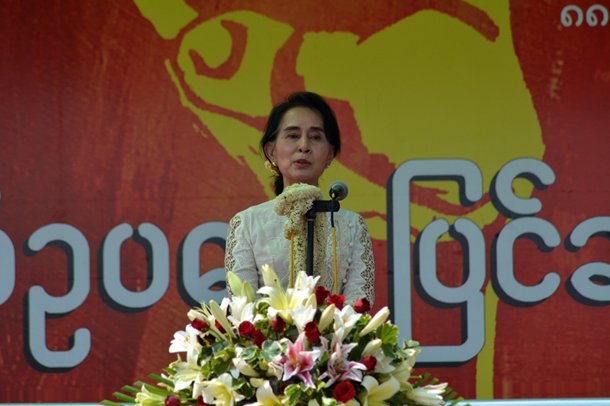 The main opposition party in Burma, the National League for Democracy (NLD), said last week that almost 5 million people signed the petition calling for constitutional reform that did the rounds from 27 May to 19 July. The petition pushed for the removal of the Burma Army’s veto on constitutional change that they have by virtue of Article 436 of the Burma Constitution. This campaign has been widely praised as a shrewd tactical move, because it would in theory unlock the door to amendments of any offending articles of the Burma Constitution that undermine democratic values and infringe upon the fundamental rights of the people. Most notably – though by no means exclusively, as the NLD and others are at pains to stress – amendment of Article 436 will in turn enable amendment of Article 59(f), which in practice bars Daw Aung San Suu Kyi running for President in the 2015 elections.
The main opposition party in Burma, the National League for Democracy (NLD), said last week that almost 5 million people signed the petition calling for constitutional reform that did the rounds from 27 May to 19 July. The petition pushed for the removal of the Burma Army’s veto on constitutional change that they have by virtue of Article 436 of the Burma Constitution. This campaign has been widely praised as a shrewd tactical move, because it would in theory unlock the door to amendments of any offending articles of the Burma Constitution that undermine democratic values and infringe upon the fundamental rights of the people. Most notably – though by no means exclusively, as the NLD and others are at pains to stress – amendment of Article 436 will in turn enable amendment of Article 59(f), which in practice bars Daw Aung San Suu Kyi running for President in the 2015 elections.
While such a public initiative is to be applauded, and the weight of support for the petition is to be welcomed, the political opposition in Burma must not allow itself to be distracted by such diversionary machinations on the part of the Burma Government and the ruling Union Solidarity and Development Party (USDP). The NLD is right that constitutional reform is essential to the establishment of genuine democracy in Burma. However, it is also time for the political opposition to test the limited democratic space that now exists in Burma, and time to start outlining a viable policy platform for government. The burden rests with the NLD and other democratic opposition parties to engineer a seismic cultural and political shift: away from politics traditionally centred on personalities and fear, and towards politics based on actual policies that will resolve people’s grievances and promote and protect their political, economic, social and cultural rights.
• • •Move to Proportional Representation a Power Grab by the Military-backed USDP
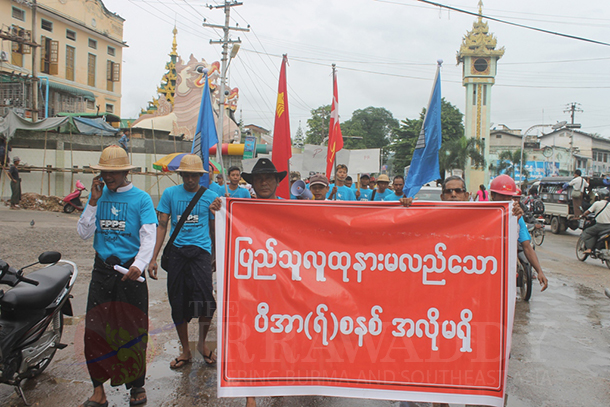 The debate over a potential change to Burma’s electoral system, from a First Past the Post System (FPP) to a Proportional Representation System (PR) is gathering momentum, with a new committee formed by the Parliamentary lower house speaker, Shwe Mann, to discuss whether this is appropriate for the country. While the general debate over suitability of differing electoral systems is complex and broad, if seen through the eyes of the context in Burma, there is one clear winner if this change is implemented before the 2015 general election: the military-backed Union Solidarity and Development Party (USDP) which is unsurprisingly supportive of this change.
The debate over a potential change to Burma’s electoral system, from a First Past the Post System (FPP) to a Proportional Representation System (PR) is gathering momentum, with a new committee formed by the Parliamentary lower house speaker, Shwe Mann, to discuss whether this is appropriate for the country. While the general debate over suitability of differing electoral systems is complex and broad, if seen through the eyes of the context in Burma, there is one clear winner if this change is implemented before the 2015 general election: the military-backed Union Solidarity and Development Party (USDP) which is unsurprisingly supportive of this change.
The argument for Burma to change to PR is certainly compelling. Theoretically, it will give smaller political parties, such as the NDF who proposed the motion, more chance of representation in the legislature, while the same goes for smaller ethnic political parties. Yet it is much more complex than this. For constituencies in ethnically concentrated areas, where there is a dominant ethnic political party, for example the Rakhine Nationalities Development Party (RNDP) in Arakan State, FPP is more advantageous for that dominant ethnic political party, as seen in the RNDP’s dominance of the Arakan State legislature. Focusing on winning seats in ethnically concentrated areas might be the only way that ethnic political parties guarantee representation under the first past the post system. Yet under PR, if the total population of a certain ethnic group is under the 1% threshold of votes needed to gain a seat that is typical of PR, then that party will not win any seats at all, even if the ethnic nationality it represents is dominant in certain constituencies.[…]
• • •
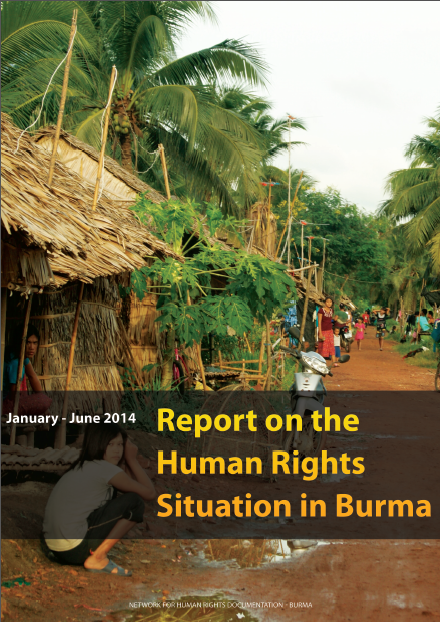








 All posts
All posts